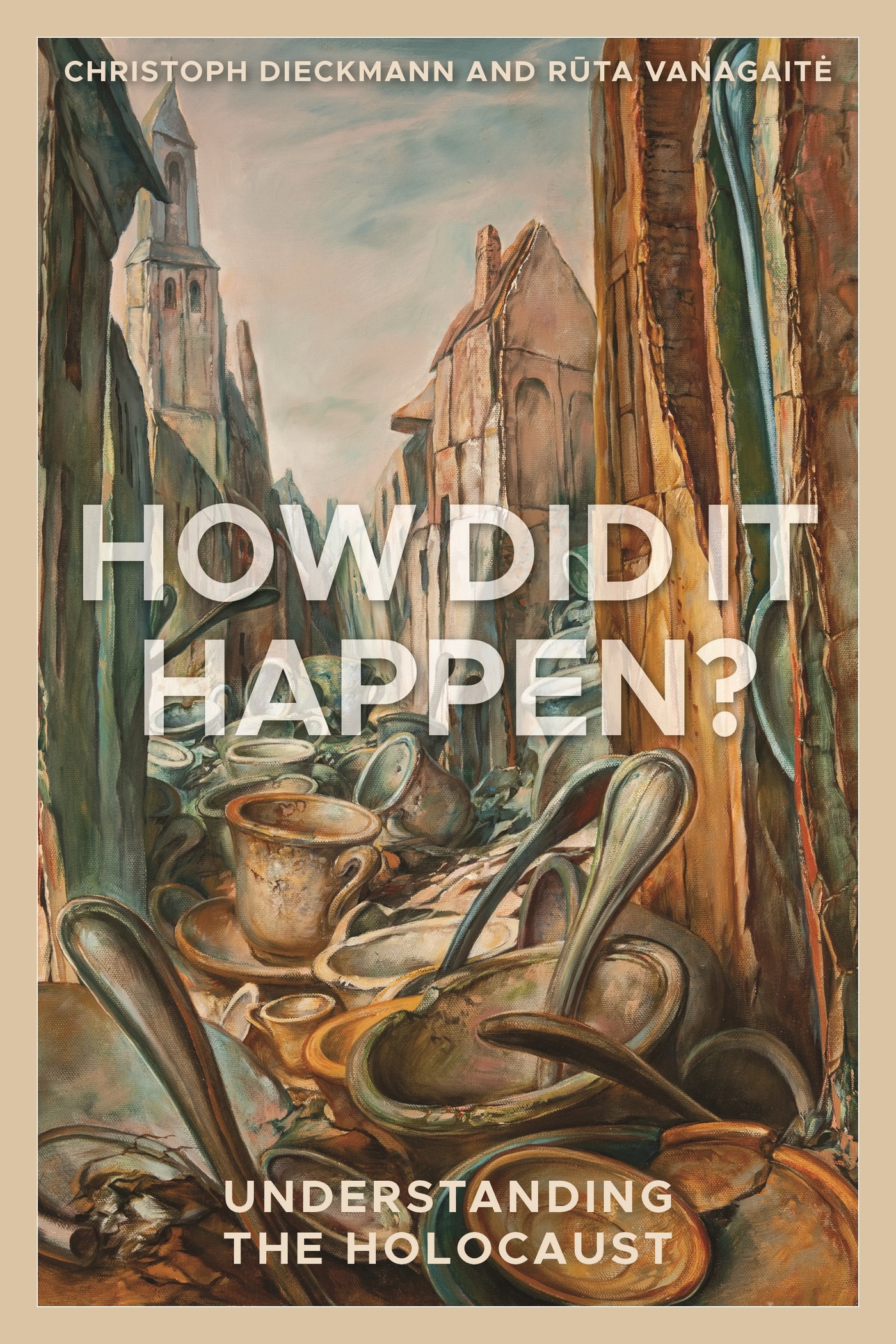How Did It Happen?
How Did It Happen?
Understanding the Holocaust
Christoph Dieckmann and
Rta Vanagait
ROWMAN & LITTLEFIELD
Lanham Boulder New York London
Published by Rowman & Littlefield
An imprint of The Rowman & Littlefield Publishing Group, Inc.
4501 Forbes Boulevard, Suite 200, Lanham, Maryland 20706
https://rowman.com
86-90 Paul Street, London EC2A 4NE
Copyright 2022 by Christoph Dieckmann and Rta Vanagait
All rights reserved. No part of this book may be reproduced in any form or by any electronic or mechanical means, including information storage and retrieval systems, without written permission from the publisher, except by a reviewer who may quote passages in a review.
British Library Cataloguing in Publication Information Available
Library of Congress Cataloging-in-Publication Data
Names: Dieckmann, Christoph, 1960- author. | Vanagaite, Ruta, author.
Title: How did it happen? : understanding the Holocaust / Christoph
Dieckmann and Ruta Vanagaite.
Description: Lanham : Rowman & Littlefield, [2021] | Includes
bibliographical references and index.
Identifiers: LCCN 2021023702 (print) | LCCN 2021023703 (ebook) | ISBN
9781538150313 (cloth) | ISBN 9781538150320 (epub)
Subjects: LCSH: Holocaust, Jewish (1939-1945)--Lithuania. | Holocaust,
Jewish (1939-1945) | Jews--Persecutions--Lithuania--History--20th
century. | Jews--Persecutions--Germany--History--20th century. | World
War, 1939-1945--Lithuania. | World War, 1939-1945. |
Lithuania--History--German occupation, 1941-1944. |
Germany--History--1933-1945. | Lithuania--Ethnic
relations--History--20th century. | Germany--Ethnic
relations--History--20th century.
Classification: LCC DS135.L5 D53 2021 (print) | LCC DS135.L5 (ebook) |
DDC 947/.5004924--dc23
LC record available at https://lccn.loc.gov/2021023702
LC ebook record available at https://lccn.loc.gov/2021023703
 TM The paper used in this publication meets the minimum requirements of American National Standard for Information Sciences Permanence of Paper for Printed Library Materials, ANSI/NISO Z39.48-1992.
TM The paper used in this publication meets the minimum requirements of American National Standard for Information Sciences Permanence of Paper for Printed Library Materials, ANSI/NISO Z39.48-1992.
Prologue
Rta Vanagait
Winter 2016, I am at a conference in Warsaw presenting the Polish edition of my book Our People, coauthored with Efraim Zuroff. A middle-aged, good-looking German historian takes the floor. His name is Christoph Dieckmann. From the first sentences of Dieckmanns speech I am overwhelmed. Everything he says is so clear, so bright, and so unexpected. After the lecture I introduce myself as the woman who wrote Our People, that book about the Holocaust in Lithuania that caused a major scandal in the country. To my surprise, Christoph praises my work. He read the book in Lithuanian! Back in those days Christoph used to be a chain-smoker, so I took every opportunity to talk to him each time he escaped the conference to have a cigarette.
Sometime later Christoph wrote a couple of wonderful op-eds in the Lithuanian media defending everyones right to explore painful facts about the history of their country. He called it an act of civic patriotism, as opposed to ethnic nationalism. History is not a religion, he said, so we dont have to believe in it. We have to study, learn, and know it. A year later Christoph wrote an introduction to the Russian edition of Our People, as did Nobel Prize winner Svetlana Alexeyevich, another wonderful person I met after Our People came out.
Then, two years later, after all my books were removed from Lithuanian bookstores and I became persona non grata in my own country, I went to Jerusalem to spend some time there. Coincidentally, Christoph came to Israel at the same time to work in the Yad Vashem archives. In his youth he studied theology at Hebrew University in Jerusalem, learned Hebrew, and got to know the Old City of Jerusalem. Christoph suggested taking me there to the best place to eat falafel and to show me an Ethiopian monastery sequestered on the roofs of the Old City.
After the tour we went for a coffee at my place. We talked about his kids, my kids. Why am I talking about the kids with this man who knows so much about the Holocaust? I asked myself. I have so many questions that bother me, and maybe I should just ask him some of them?
So I askedjust one question.
Christoph, after Our People came out, a story was published in a Lithuanian paper about the father of our then-president Valdas Adamkus. In 1941, Mr. Adamkaviius was the chief of transport police at the Kaunas railway station. In November of 1941, five thousand German and Austrian Jews were brought to this station. After disembarkation they were marched straight to the pits of the Ninth Fort in Kaunas. No one survived. A journalist asked our president: Do you know anything about your fathers role in the Holocaust? Valdas Adamkus answered: We did not talk about these things at home. I keep thinking: could the presidents father have known why these eighty-three cattle cars of Jews were brought to Kaunas?
No, I am sure he did not know. Only a few people from the SS and the top of the German civil administration would know that these European Jews were brought to Kaunas not to live in the ghetto but...
I stopped listening to Christoph, and I did not hear a word he was saying. He noticed my distraction and asked,
Ruta, are you listening?
No, Christoph, I am not. I just got this absolutely crazy idea and I have to tell you about it.
OK, go on.
You know, when I wrote the book Our People, both politicians and historians accused me of being a dilettante. They said I didnt have a clue about this complicated subject and still dared write a book about it. OK, I agree. I was a dilettante. And I still am. After writing the book, I still have a lot of unanswered questions. New questions keep coming up all the time. Someone said the Holocaust is like a black hole: once you start exploring it, you cannot escape anymore. And look what happened: by sheer accident I met you, Christoph Dieckmann, a person who has an incredible amount of knowledge about the Holocaust in Lithuania. Two minutes ago I suddenly realized what I have do. We have to write a book together. A book of conversations: my questions, your answers. I would ask you simple, maybe the nave questions of a dilettante. I am not afraid to look stupid to you. Christoph, dont say anything now. Think about this idea and if you find it interesting, call me in a couple of days while you are still in Israel.
Christoph did call me in a few days. He said: Lets try. Come to Tel Aviv, and we will talk. Bring your tape recorder.
On Monday, March 13, 2018, a hot, sunny day, I arrived in Tel Aviv. We climbed to the rooftop terrace of the hotel where Christoph was staying. We moved plastic chairs from the heat into the shade. I took out the recorder, put it on the plastic table, and asked Christoph my first question. Our eighteen-month-long journey had begun.
Acknowledgments
The editors of the English edition Rachel Kisin and Geoff Vasil.
The numerous participants in the crowd-funding campaign organized by Elena Green.
The Vilna Gaon Museum of Jewish History, Samuel Bak Museum that gave us permission to use Samuel Baks picture for the cover of the book.
Chapter 1
Next page
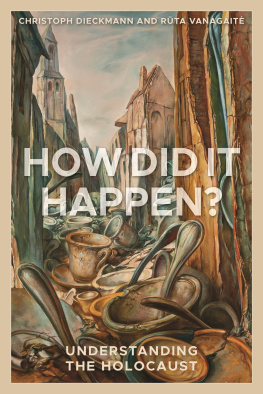

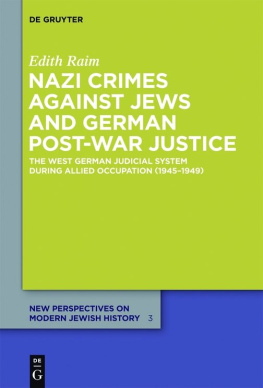
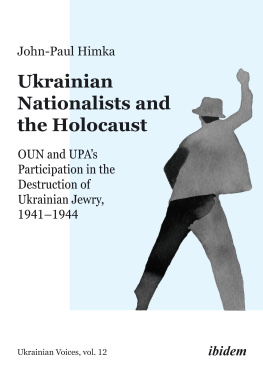
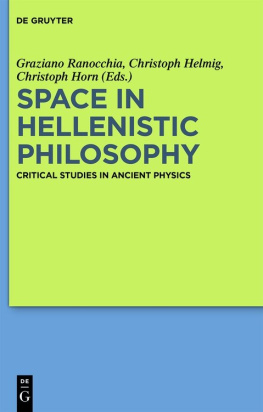
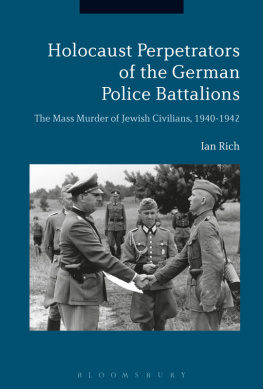
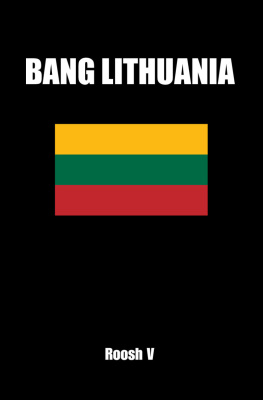
 TM The paper used in this publication meets the minimum requirements of American National Standard for Information Sciences Permanence of Paper for Printed Library Materials, ANSI/NISO Z39.48-1992.
TM The paper used in this publication meets the minimum requirements of American National Standard for Information Sciences Permanence of Paper for Printed Library Materials, ANSI/NISO Z39.48-1992.